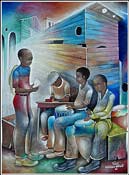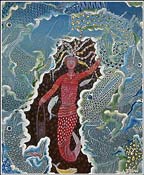IntroductionHaitian Creole
The Soul of the Haitian People
Haitian Creole is the only language spoken by the entire population of Haiti. Although French has long been the official language, it is spoken fluently by less than 20% of the Haitian population. In order to truly understand Haitian culture, history, and current social conditions in Haiti it is a great asset to have an understanding of Creole and the issues, both social and political, that surround it. The following is a broad overview of some of these issues facing the Haitian Creole language as well as links that will provide a more comprehensive knowledge of Creole's place in Haitian culture as a whole. For a complete fact sheet on Haiti visit www.portauprince.com.
- What is A Creole Language
- Historic Background
- Modern Misconceptions
- What are the Linguists saying
- Creole in Daily Life and Religion
- Creole in Haitian and Caribbean Music
- Written Creole and Creole Literature
- The Future of Haitian Creole
Creole Languages are common throughout the world. There are numerous varieties of Creole each with their own distinct origins. Some examples would include Portuguese Creole, spoken in the Cape Verde Islands, French Creole spoken throughout the Caribbean and English Creole, also spoken in various countries in the Caribbean. As with any other language, each Creole has distinct dialectical differences according to region. For instance, the Haitian Creole spoken in Port-au-Prince will have a dialect slightly different than that of Northern rural towns throughout the countryside. Likewise, The Creole spoken in Martinique is of a markedly different dialect than that of the Creole spoken in Haiti, although one is generally comprehensible by speakers of the other.
To gain a true understanding of Haitian Culture it is necessary to also gain a knowlegde of Haitian Creole since as the name of this site suggests, the language of Creole truly portrays the soul as well as the history of the Haitian people. Creole in Haiti was the result of contact between European romance languages, namely French and Spanish, and various Central and West African languages. This contact happened within the context of colonial plantations on the island of Hispaniola, the second largest island in the Caribbean. With the onset of the Haitian revolution and consequently Haitian independencein 1804, Haiti was isolated from the European community due to an animosity that stemmed from European fears of what a similar slave revolt could do to their own slave driven economies. Because of this, Haitian Creole developed a distinctly unique grammer from the other French Creoles of the world.
Pseudo-scientific racist theories, beginning in the 19th century, began to brand Creole and African languages as "primitive" or somehow "less sophisticated than European languages." Other theorists went as far as to say that Creoles were not languages at all. Despite the fact that the modern linguistic community has disgarded such Eurocentric and racist ideologies, the stigma placed on Creole still lives and quite often manifests itself as a dividing trait between the educated elite, who often use French speech as a badge, and the majority of monolingual Creole speakers. Such disparate views of the Creole language, especially by those who speak it, continually further the political and social divide between the rich and the poor in Haiti.
Current leaders in Creole studies and specifically Haitian Creole studies include The Creole Intitute at The University of Indiana as well as Michel Degraff of MIT. Michel Degraff has been instrumental in dispelling some of the many myths that have surrounded Haitian Creole over the last few centuries. In his work on the Creole genesis, Degraff challenges the commonly held misnotion that Creole morphologies are without derivation or inflection. Using concrete examples of Haitian Creole morphology, Degraff presents a compelling case for the presence of derivational and inflectional properties in Haitian Creole.
Creole is the langage of life in Haiti for most of the population. Although French is fluently spoken by about 20% of the population, most Haitians speak Creole around the house and throughout their daily activities. French is taught in school and also takes an administrative role in government. Most Haitians are Catholic yet protestant religions are becoming more common throughout Haiti, often times arriving with American and European missionary activity. Although the American media has tended to misrepresent its true nature, Voodoo is a common religion amongst many Haitians and has positive functions in many communities. While some Catholic services are now conducted in Creole, there are many still conducted in French. Voodoo ceremonies are always conducted in the Creole language.
Listening to Haitian and other Caribbean Creole language music is a great way to familiarize oneself with Haitian as well as the greater Caribbean Creole speaking community. The most popular forms of music in Haiti are Zouk and Konpa. Konpa was created by singer songwriter Nemours Jean-Baptiste out of a mixure of music from the Dominican Republic, African music, and other Caribbean Styles. Konpa resides as the most popular form of Haitian music both inside and outside of Haiti. Racine music, or roots music is also popular, especially with the younger generation. Racine mixes African styles with reggae and is heavily influenced by Voodoo.
Haitian Creole is a written language despite many misconseptions stating otherwise. Because of its relative newness as a language, Haitian Creole does have problems with standard spellings, much as the English language had during Shakespear's time. Since its inception as a co-official language, many government documents such as passports have begun to be printed in French and Creole. Haitian author Félix Morrisseau-Leroy among others have published their works in Creole as well. Despite these steps, the majority of admistrative tasks and printings are done in French. Great steps are needed to move towards a Creole standard which would allow for its further use in an administrative and educational context.
The solution to the Creole debate requires first, erasing common misconceptions surrounding Haitian and other world Creoles. Continued development of the Haitian Creole language will require the further development of written standards as well as the erasure of French as a status symbol, marking those who speak it as somehow superier to their monolingual Creole speaking countrymen. Such attitudes are left over from a bygone day of excepted pseudo-scientific European racism and wrapped up in a history of French and American imperialism. A standardization and elevation of Creole as the real language of Haiti rather than a minority language under that of French will bridge the gap between the rich and poor that is so obvious as one travels through this beautiful country.
 |
 |
 |